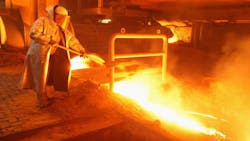Iron Ore Climbs as Signs of China Property Revival Boost Outlook
Iron ore extended a gain toward $60 a metric ton as further signs of a recovery in China’s property market, coupled with policy makers’ plans to loosen margin-lending controls in equity trading, helped to improve sentiment.
Ore with 62% content in Qingdao rose for a fourth day, increasing 2.3% to $58.82 a dry ton, according to Metal Bulletin Ltd. After dropping in January as concern about a global glut persisted, the commodity rallied 19% last month. This quarter it’s up 35%, with the advance also supported by a weaker dollar and interruptions to supply.
Iron ore has advanced this year, rebounding from three annual losses and surprising forecasters who’d predicted further declines, amid expectations that steel demand in China may rise after policy makers signaled their willingness to support growth. China’s home prices climbed in the most cities since March 2014 after the government loosened curbs, according to data on Friday. The country also said it will also boost lending to brokerages for their margin-trading business, spurring equity-market gains on Monday.
“Positive sentiment in the Chinese steel market is resonating from the plans to loosen margin lending in the stock market,” said Daniel Hynes, senior commodity strategist at Australia & New Zealand Banking Group Ltd. in Sydney. “Further gains in house prices is also supporting steel and iron ore.”
The jump in the Metal Bulletin price on Monday was preceded by gains in futures in Asia. The SGX AsiaClear contract for May settlement rallied as much as 4.8% to $55.95 a ton in Singapore, while on the Dalian Commodity Exchange most-active futures closed at the highest level in a year.
Iron ore’s gains have unfolded against a battery of predictions for further losses driven by the global glut and slowing demand for steel. As prices rallied this year, including a record one-day gain to $63.74 on March 7, both ANZ and Goldman Sachs Group Inc. have reiterated bearish forecasts, with the New York-based bank maintaining a year-end target of $35.
New-home prices in China gained in 47 cities in February from 38 in January, according to the National Bureau of Statistics. Investment in real estate development reversed a two-year downward streak in the first two months, with sales accelerating to 3% from a 1% rise throughout 2015.
Investment in real-estate development in China has improved and prices have stabilized, with clear signs of a recovery, according to Gao Xuefeng, an analyst at Sinosteel Futures Co. Demand for steel and iron ore is expected to rise, Gao forecast in a note on Monday.
While China started easing property curbs in 2014, the measures have lifted prices in the biggest centers instead of easing a glut of unsold homes in smaller cities. Shanghai officials are now planning measures to stem the price surge, according to people with knowledge of the matter.
Infrastructure and construction account for about half of China’s steel consumption, Bloomberg Intelligence analyst Yi Zhu estimates. Steel demand will keep declining in 2016 and beyond as the country seeks to transition from growth led by investment and manufacturing to consumption and services, according to the China Iron & Steel Association.
There haven’t been significant changes in iron ore’s fundamentals over the past two weeks, according to Di Wang, a raw materials analyst at CRU Group in Beijing. As inventories of unsold properties remain high, it’s uncertain whether the recovery is sustainable, she said by e-mail on Monday.
By Jasmine Ng
About the Author
Bloomberg
Licensed content from Bloomberg, copyright 2016.
